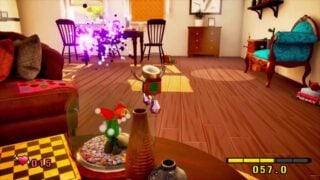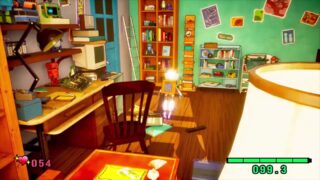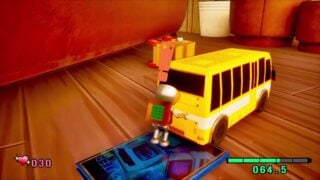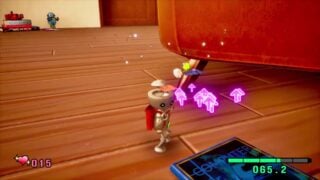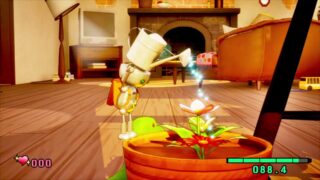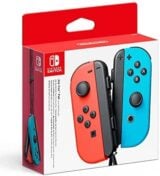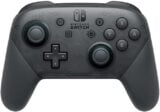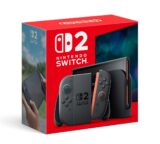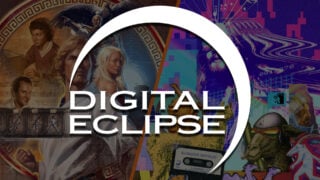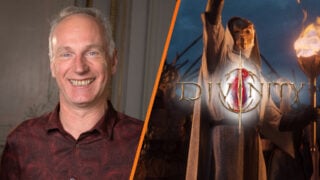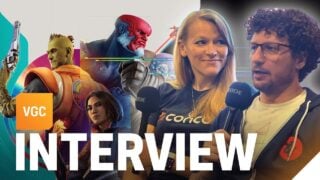koROBO interview: ‘I don’t want people to approach this as a new Chibi-Robo game’
VGC talks to the former directors and composer of the Chibi-Robo series
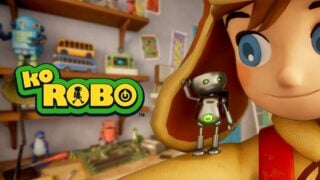
Of all the Nintendo games getting the remake and remaster treatment throughout the Switch generation, one metallic little charmer has gone mainly ignored.
The last time Chibi-Robo starred in a game was back in 2015 with Chibi-Robo Zip Lash on the 3DS, and since then there’s been nothing.
Part of this may be down to the apparent dissolution of Skip Ltd, the studio that was responsible for the Chibi-Robo series. With Skip no longer around, it appears Nintendo has been hesitant to hand the robo-buddy’s power adaptor to another studio.
Last week, however, during the BitSummit indie festival in Kyoto, a new studio called Tiny Wonder announced that it was working on koROBO, a game that looks more than a little like Chibi-Robo.
On paper, it’s little wonder this is the case – koROBO, which has just launched its Kickstarter and is already more than halfway to reaching its target after the first day – is being developed by a team consisting mainly of former Chibi-Robo developers.
The three co-directors – Kenichi Nishi, Keita Eto and Hiroshi Moriyama – directed every Chibi-Robo adventure between them. Composer Hirofumi Taniguchi returns, as does character designer ‘Hikarin’. It very much feels like this is supposed to be a spiritual successor to Chibi-Robo.
And yet, as I spoke to Nishi, Eto and Tanaguchi at BitSummit shortly after the koROBO announcement, the trio went to great lengths to stress that, in their minds, this is something different.
Whether koROBO genuinely is an entirely different beast to Chibi-Robo remains to be seen, but for fans of the series, it may be the closest thing they’ll get for a while.
The below interview was translated by an interpreter.
It’s been nearly ten years since the last Chibi-Robo game, and the last Skip Ltd game. What happened after that?
Kenichi Nishi: The last Chibi-Robo game was on the 3DS. After that, we went on to work on some small separate projects. Talking about Skip itself, first some of the core members left started working on different things, and kind of went away from the franchise as a whole.
So when was the decision made to come back together, form Tiny Wonder Studio and say ‘let’s make a spiritual successor to Chibi-Robo’?
KN: Before answering your question, just to make this known, after announcing the game the other day, a lot of people have referred to this game as being heavily inspired by or a heavily similar game to the Chibi-Robo series. But I think that’s just because they’re looking through these lenses that are tainted with their experience of having played Chibi-Robo. And actually, this is its own very different sort of game.
One of the big reasons starting off was just thinking: ‘I want to do something using crowdfunding, what can we do?’ And starting from that point I thought: ‘Okay, well, what if we started with a game that’s this sort of idea, this sort of genre and go down that route?’
Then, once I got that idea I thought: ‘Yeah, that’s a good idea, who do we do it with?’ So I thought of people I used to work with, so we had people like Hiroshi Taniguchi, Hiro Moriyama, and all the other people we used to work with.
Even though the members of Skip had gone our different ways and we weren’t working on the same projects anymore, individually, there was a lot of collaboration going on between everyone, sharing music or art assets or things like that as we went along.
And so what I decided to do from there was to reach out to them and say, ‘hey, does anyone want to help me with a new game?’ And I don’t know if it was because they all just had a lot of free time on their hands or not, but everyone seemed pretty interested in the idea.
So going back to what you were saying, this is not considered a remake or even a reimagining of Chibi-Robo, but a separate, different project that just happens to have a small robot in it? And so fans shouldn’t assume this is an attempt to say ‘here’s what a Chibi-Robo game would look like today’? Is that accurate?
Keita Eto: Being the people who worked on and created the original Chibi-Robo, that game is something that was built from our own spirit itself. So that game has our spirit in it and we have the spirit of that game in ourselves too.
So making a new game inspired by our same internal spirit, you can kind of see why some of the influence would be the same, and why you might be able to assume that people who enjoyed games that we made before will still enjoy the games that we are making now.
I mean, a lot of these questions will mention Chibi-Robo, I feel bad if the comparison is going to get annoying.
KN: Don’t worry about making these comparisons. There’s no problem at all. But another thing for you to know is that we’re all right around the same age, we’re all veterans in the industry, and personally my eyesight is starting to go quite a bit. So I suggested that we make something that was a lot bigger rather than a lot smaller, so it would be easy to see, but no. (laughs)
Like a giant robot?
KN: Yes! (laughs)
“Being the people who worked on and created the original Chibi-Robo, that game is something that was built from our own spirit itself. So that game has our spirit in it and we have the spirit of that game in ourselves too.”
When you were working on the original concept for this game, were there any attempts to approach Nintendo and ask if it was interested in another Chibi-Robo game, or was this always supposed to be a separate project altogether, with no attempt to bring that IP back?
KN: No comment. (laughs)
The theme in this game is saving the planet, and koROBO has a solar panel on him instead of a plug like Chibi-Robo had. Does that completely change the way the game is played because there’s no longer a need to keep finding power sockets?
KE: So, first things first, it is definitely going to be completely different. It’s a different game, so everything is going to work very differently.
But if you want to compare the two, in the Chibi-Robo games you’re running on your electricity, so you always needed to be aware of where the outlets were, how long your cord was, so that kind of restricted your movements based on that.
This time around, since you’re moving by solar, it will be restricted by light in a sense, but it will be more strategic in a way. Certain rooms may have more or less light than others, and there’ll be certain times of day – it’ll be brighter during the day than it will be at night.
There’s also non-solar related energy that you’ll be using, such as wind, and you’ll only be able to use that in places where there is enough wind to provide power. So there’s a lot of strategy involved in how you move about.
It’s been nearly two decades since the first Chibi-Robo. What has the team learned in those years, in terms of game design, that you think will apply to this new game and differentiate it from that series?
KN: Everyone has aged a lot in the years that have passed. But one thing personally is that I’ve had a child since those 18 years have passed.
Back during the Chibi-Robo games there was a child present in the game, but that child was based on my personal experiences, thinking of myself as a kid and what I would have done, and how I would have felt about it, and that went into the game.
But now, since I have my own kid who’s around the same age as Tom in the new game, I’ve looked at my kid growing up, and kind of naturally got a new idea of how kids interact with the world.
So it’s watching my kid playing with gadgets and taking things apart and reminding me that, yeah, this is what kids actually enjoy. It’s not what’s in my head, it’s what I’m seeing here with this kid in real life.
Another big change over all these years is that I’ve changed the way I think about making games. I’m not really interested in – if you want to make a baseball comparison – just doing the best, quickest, straight fastball right down the middle, to get everything perfect in that sense.
“We used to get in a lot of fights about how we were going to go about making a game back in the day. Now, it’s just more fun, with all of us doing what we want, as we put things together.”
Instead I prefer focusing more on the more interesting throws, throwing a curveball, and adding in some different things that we can do with all the things we’ve learned along the way. I’m not trying to say we were passion-driven then and we’re not now. There’s as much passion now as there was then.
But now we’re also enjoying ourselves while we’re at it, not just working to make the best thing that makes the most success, but make something that will succeed that we enjoy, that’s fun, and that takes in everything we’ve learned along the way.
Another thing is that we used to get in a lot of fights about how we were going to go about making a game back in the day. Now, it’s just more fun, with all of us doing what we want, as we put things together.
Is part of that down to a lack of studio pressure? Obviously, there’s pressure that comes with crowdfunding a game and ensuring enough people are interested in it to pay up, but does it also relieve some of the pressure because there’s no studio breathing down your neck to get something out in time?
KE: Yes, one good thing about doing crowdfunding that takes some of that pressure off is that when you’re working, let’s say, for a big client that’s telling you to make the game, you are making the game for the client – they’re telling you to make something – but the product itself is for somebody else.

It’s not for the client, it’s for the people who are going to buy it. But there’s a big separation between what the client wants, perhaps, and what the people who are going to play it in the end want.
With crowdfunding, what you get to do is collect the money from these backers who want the game, you’ll make the money from those people who are supporting the game, and instead of making it for somebody in between, you’re making it for the people who are putting the money on the table.
You’ve made it very clear to me that koROBO isn’t considered a successor to Chibi-Robo, but Taniguchi-san, how does that relate to the music? A lot of people loved the music in Chibi-Robo, but does the same philosophy apply here, in that you’re not making something that feels like the previous soundtracks, and will instead try something different to reflect the differences in the game?
Hirofumi Taniguchi: So, is it inspired directly by it? Not really. I wasn’t thinking about that as an influence as I was making the music this time. But what I have done, not just for this project but over the years, is re-listen to my music, because to be quite honest, I don’t perfectly remember every single song that I’ve made.
But I’ve gone through and relistened to old tracks from the old games, and had some re-findings listening through things that I’ve worked on in the past, and noticing changes between that and the work that I do now, and noticing that maybe my style today isn’t the style that I had at that point in time.
Now, as technology has improved and my skills have improved, I work on making music that it’s perhaps more technically difficult to make, but easy for the player to listen to, something that anybody can enjoy.
“One good thing about doing crowdfunding that takes some of that pressure off is that when you’re working for a big client, you are making the game for the client… but the product is for somebody else.”
I noticed that in the past, I wasn’t at a level where I could have done something like that, but now I can. If I was going to describe my music this time around, it’s perhaps more mild. Something that is for all audiences and not just for maybe a particular subset of people.
KN: On the crowdfunding page, you currently have three songs posted for the game itself. One is a battle theme, another is a game theme for one of the rooms, and the other is a theme about friendship between the characters, between the environment, between the whole world, that’s the theme.
And normally when we’re working on stuff together, we don’t really go out of our way to go over the top, saying ‘wow, you did something really great there, that’s amazing, we all love that’. It’s not something we normally do. But this time around, this friendship song, it’s something that everyone just agreed and came out and said ‘this is really good’.
In fact, for the trailer that we have – which is only 90 seconds long, and doesn’t have a whole lot of room to fit everything in – we kind of forced as much of this song as we could into it because we just wanted everyone to be able to listen to that and to enjoy it.
I touched on earlier about how, when we were younger, it was more about throwing everything at something, everything we could possibly do to just make a certain thing, doing our best, using all the energy that we have. Now it’s something more, again, mild, maybe a little mellower.

But it’s because we have these improved skills that means we don’t have to force it out anymore. We can be relaxed, we can be calm and still make something that’s really good.
This time around the music is much more piano focused, you’ll only hear the piano and it’s a lot simpler in that way. Instead of being something in your face with too much energy in it, it’s something more like sitting down in the hot spring and enjoying yourself, and relaxing and feeling refreshed.
So thinking about it as a phrase, I guess sometimes simple is best, and that’s how we’re going about approaching this.
The game will feature time travelling. Can you talk yet about how this works?
KN: It all started early on in the beginning. I was talking with [producer Hisashi] Koshimizu about ‘ok, we’re going to make this game, it’s going to have a small robot in it, what can we do to make it more interesting?’
So what we did was go to ChatGPT and ask it for some ideas. And you know, ChatGPT throws out so many different things, and some are terrible, some are not. But among those ideas that it threw out, one was time travel. I saw that and thought ‘hey, actually that sounds like it could be a pretty good idea. It could be pretty fun. Let’s try doing that.’
So, together with Koshimizu-san and [co-director Hiro] Moriyama-san, we watched movies that focused on time travelling and of pulled some ideas and themes out of those, pieced them together, stitched together a story where we could use these kinds of ideas and it came out to be something that seemed pretty good.
“The Chibi-Robo series itself has travelled between different people’s hands, with different people working on it. So I don’t really feel connected to it in a way that I don’t want anyone to do anything to this game.”
Can you say whether it involves going into the past, or the future?
KN: No comment. [laughs]
Just a few quick questions unrelated to koROBO – Was there ever a time when your adult-themed Wii adventure Captain Rainbow could have ever been released in the west? It was such a wildly unexpected tone for a first-party Nintendo game and we never got to play it.
KN: Ask Nintendo.
Well, speaking of Nintendo, it currently has a habit of remaking and remastering a lot of its previous games. How would the team feel if, at some point, Nintendo decided to remaster Chibi-Robo? Would you be happy that a new generation would get to play it, or would it be like someone taking over custody of your child?
KN: Just speaking from my own point of view, the GameCube game was the game I was director on, then when it went to the second and third games, Moriyama-san was the director, then for the fourth one it was Eto-san.
So the Chibi-Robo series itself has travelled between different people’s hands, with different people working on it. So I don’t really feel connected to it in a way that I don’t want anyone to do anything to this game. I would be happy to see that it’s still living, and it hasn’t gone away forever in that sense.
Nishi-san, you’ve said in the past that Dragon Quest III is your favourite game of all time. What do you think about the HD-2D version that’s in development? Will you play it, or will you stick with the Famicom original?
KN: Similar to my reply to your previous question, I don’t want to see games go away forever, so I do think these remakes are actually really great.

Will I sit down and play it? Probably not. I don’t think I’ll have the time to play through Dragon Quest III again, but I did play it when it came out in real time and I had that experience, and I’d love for the younger players today to have that same sort of amazing experience that I had as a kid.
I still remember the story and the music from the game, in particular Alefgard, When I first heard that it gave me goosebumps and I thought ‘this is incredible, game music can do this to me’.
That game was made by the top level of people making games at the time, it was the perfect thing. This remake is going to be a collaboration of different people working on it again to make basically the definitive version of this Dragon Quest game. And I think that’s great.
Going back to koROBO, I know you say this is 100%, absolutely, categorically, definitely not a Chibi-Robo game. But despite that, what message do you have for the loyal Chibi-Robo fans who are sitting, credit card in hand, thinking of backing koROBO on Kickstarter?
KN: So, again, this is a new game, and has no relation to the other games. So I don’t want people to approach this as if they’re going to be playing a new Chibi-Robo game. I want them to instead look forward to what kind of new things we can do with the concepts that we’re working with.
And you know, one really important thing to keep in mind this time is the members who have come together to work on it. We have people who worked on the first one, the second one, the third one, all coming together as one team, and that’s key to this game.
All of us working together, when these minds and these skills come together, what can we make? We want you to look forward to that.
Go into it with a fresh pair of eyes and don’t be influenced by anything that’s come before it.
Since we have the directors from all these games coming together to work on something good, and we’ve all had that experience that we’ve had before, all our skill levels have gone up and we’re all better than ever, and we’re now making something together.
The only thing that’s different this time around is that we’re not doing this with Nintendo, which means if we make something that’s really good, we are amazing. And if we make something that doesn’t come out as good, well hey, then Nintendo is pretty amazing. [laughs]
